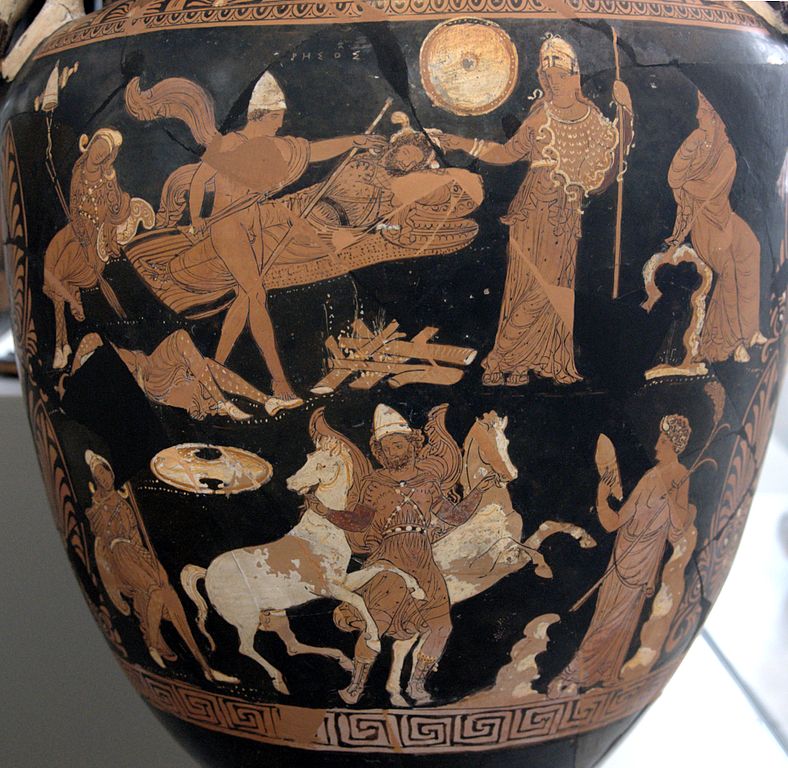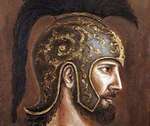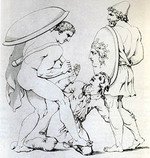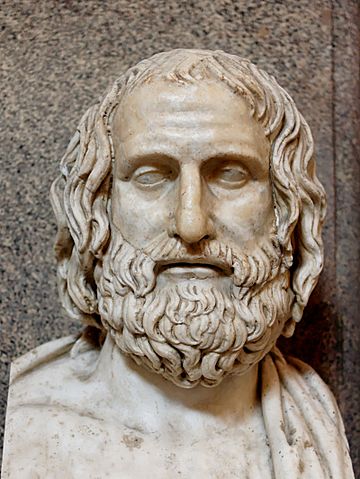
Rhesus
Rhesus by Euripides
Transmitted among the plays of Euripides, but disputed to have been written by him ever since Antiquity, Rhesus is probably a mid-fourth century tragedy that takes place some fifty days before the ending of the Trojan War, on the night when Diomedes and Odysseus sneak into the Trojan camp. It begins at night, with a few Trojan Watchmen (the Chorus) waking up Hector to inform him that there is some activity in the Greek camp and that they might be fleeing. Hector’s determination to use this to Troy’s benefit and attack straightaway is placated by Aeneas’ suggestion to send a spy beforehand; Dolon accepts the mission on the condition that he is given Achilles’ horses as spoil of battle at the end of the war. As Dolon leaves (disguised as a wolf), a shepherd arrives at the Trojan camp and announces the arrival of the Thracian king Rhesus with his powerful army. Even though Rhesus has come to help the Trojans, Hector doesn’t welcome him gently, admonishing him for appearing so late in the war. Rhesus gives an explanation for his belatedness—Scythian invasions of his home country—which Hector accepts; from thereon, the two move on to devising a plan of attack for the next morning which should prove to be fatal for the Greeks. Soon after Hector sends Rhesus and his men to a camping-place, Odysseus and Diomedes appear, having captured Dolon and unwavering in their determination to kill the Trojan leaders while they sleep. The goddess Athena appears and suggests the two to slay Rhesus first and take his horses as war spoils. The plan is threatened to go awry when Paris appears, but the Trojan prince is deceived by Athena who takes the guise of Aphrodite, the guardian-goddess of Paris. Soon after, a wounded Thracian charioteer announces the death of Rhesus and blames the theft of his horses on Hector. Hector, however, is pretty sure that this must be the work of Odysseus—something which the mother of Rhesus (a Muse) confirms after suddenly appearing with the body of her son. In addition to Odysseus, she also blames Athena for Rhesus’ death, and threatens to never again visit the city of Athens or bring to it any other learned men.
Date and Historical Background
Even though Rhesus has come to us in an anthology of Euripides’ tragedies, both its date and its authorship are questionable. And this seems to have always been the case, as evidenced by the hypothesis (the “introduction”) of the play in the anthology itself which explicitly says that “some suppose that this drama is apocryphal, believing it is not by Euripides.”
Considering all the internal indications, many modern scholars deem Rhesus a very late play, most probably written in the mid-fourth century by a Macedonian author (compare the remark of the Muse on Athens at the end of the play). However, if it was written by Euripides, then it must be an early work, with some dating it all the way back to 450 BC.
Characters and Setting
Characters
• Hector, son of Priam, Trojan prince, and the greatest warrior for Troy in the Trojan war
• Aeneas, cousin of hector
• Dolon, Trojan soldier
• Shepherd in the role of a Messenger
• Rhesus, a mighty warrior, the king of Thrace, a Trojan ally
• Odysseus, Greek king of Ithaca, the most cunning of all Greek soldiers under Troy
• Diomedes, Greek king of Argos, one of the best warriors of all the Achaeans
• Athena, goddess of wisdom and war
• Muse, unnamed; one of the nine goddesses of inspiration, mother of Rhesus
• Charioteer of Rhesus’ chariot in the role of a Messenger
• Chorus of Trojan watchmen
Setting
A Trojan outpost near the Greek camp in the tenth year of the Trojan War.
Summary of Rhesus
Parodos (Entrance Song)
Unlike almost every play written in the second half of the fifth century, Euripides’ Rhesus doesn’t begin with a prologue (although an ancient hypothesis—i.e., an introduction—suggests that the play might have had one), but with a parodos (entrance song of the Chorus) taking the form of epirrhematic dialogue (sequence of sung and recited sections) between the Chorus of Trojan watchmen and Hector. It starts with the watchmen waking up Hector in the middle of the night to report to him that “the long night through… the Argive army has kindled fires, and bright with torches shines their anchored fleet.” They are not sure what this might mean, but it doesn’t stop them from rousing Hector: “To arms!” they say. “Hector, seek your allies' sleeping camp! Stir them up to wield the spear! Awake them!”
First Episode
The discussion between the Chorus and Hector continues in the first part of the second episode. Hector interprets the fires as a sign that the Greeks are fleeing, but isn’t as happy as he probably should be, blaming himself for listening to the advice of the Trojan seers and delaying his already planned attack on the Greek camp for the morning. If he hadn’t done that, he says, he would be the one to set fire to the Greek ships and the one making his way from tent to tent and drenching his hand in Achaean blood. Be that as it may, he can do the next best thing: awake his soldiers and order them to attack in great numbers the retreating Greeks, “so that many an Achaean, as he leaps aboard his ship, shall be smitten through the back and sprinkle the ladders with blood, and others shall be fast bound with cords and learn to till our Phrygian fields.”
The Chorus is suddenly far more cautious: “You hasten, Hector,” they say to him, “before you know clearly what is happening; for we do not know for certain whether the men are flying.” Fortunately, this feeling is shared by Aeneas who joins the company after having noticed, half-asleep, “the midnight conclave” around Hector’s bed. “Let us leave our men to sleep calmly under arms after the weariness of battle,” advises Aeneas, “while we send whoever will volunteer to spy upon the enemy; and if the Greeks really are preparing to fly, let us arise and fall upon the Argive army. However, if this signaling is a trap to catch us, we shall discover from the spy the enemy's designs and take counsel.” Since the Watchmen are fully behind Aeneas’ proposal, Hector agrees with them. The discussion between the two is barely finished when Dolon arrives, volunteering to be the spy, but hoping to receive “fitting wages” for the endeavor. Hector agrees with the proposal and offers Dolon a few possible rewards—a daughter of Priam, gold, to have the honor of killing Ajax—but Dolon refuses them all and asks for Achilles’ immortal horses instead. Even though Hector had hoped to get them, he yields to Dolon’s wishes and promises him the horses.
As Dolon camouflages himself as a wolf—planning to deceive the Greeks by walking on all fours—the Chorus celebrates his success in advance in the first stasimon of the play, a sort of prologue to the final Trojan victory in the war.
Second Episode
Just as soon as Dolon leaves, a shepherd arrives before Hector’s tent to announce the arrival of King Rhesus, “mounted like a god upon his Thracian chariot,” at the head of a powerful army. “The number of this army,” explains excitedly the messenger to Hector, “you could not reckon to an exact sum, for it was beyond one's comprehension; many knights, many ranks of targeteers, many archers, a great crowd of light-armed troops, arrayed in Thracian garb, to bear them company. Such the man who comes to Troy's assistance, whom the son of Peleus will never escape, either if he tries to escape or if he meets him spear to spear.”
The Chorus greets the news quite enthusiastically, but Hector is not that impressed. “I shall find many friends now that fortune smiles upon my warring and Zeus is on my side,” he says, implying that Rhesus is an opportunist who has joined his forces only after realizing that the Trojans will win the war. Suggesting that it is never smart to chase away your own allies—and claiming that, whatever Hector’s feelings Rhesus’ “mere appearance would cause a panic among the foe”—the watchmen eventually persuade Hector to accept Rhesus in his camp.
The watchmen rejoice in this outcome in the second stasimon, celebrating the greatness of Rhesus, son of the river god and a Muse. “Come, appear, brandish that shield of gold full in Achilles' face,” they sing. “For none after facing you will ever join the dance on the plains of Argive Hera; no, but he shall die, slain by Thracians, and this land shall bear the burden of his corpse and be glad.”
Third Episode
Rhesus finally arrives and greets Hector, while announcing his intention to help the Trojan prince raze the Greek walls and fire their fleet of ships. Noting that he never wants to be anything but honest, Hector replies by openly reprimanding Rhesus for arriving too late in the war and accusing him of being a bad ally. “It was I with this arm that raised you from your paltry princedom to high lordship over Thrace,” says Hector, reminding him of the time when he helped him establish his power in Thrace. “But you have trampled on this great favor done you, and come with laggard step to give your aid when friends are in distress.”
Rhesus justifies his belatedness by pointing out that as much as Troy needed him during the past few years, his country needed him even more, because the Scythians had opened war on Thrace on the very eve of his intended departure for Troy. In addition, it was not easy for him to reach Troy even after defeating the Scythians: unlike Hector who was probably sleeping soft at the time in his gilded palace, Rhesus had to pass through “the frozen hurricanes that vex the Thracian sea and the Paeonian shores.” Finally, even though he comes ten years after the start of the war, it’s basically as if he has come on the very first day, since neither side has ever made any progress in a decade. “But the light of one day will be enough for me to sack those towers and fall upon their anchored fleet and slay the Achaeans,” boasts Rhesus, promising to also impale Odysseus, the wiliest of all Greek commandeers, at the outlet of the Trojan gates and “set him up for winged vultures to make their meal upon.” Hector is eventually convinced and, after telling him the password (“Phebus”), advises Rhesus to immediately go to his quarters and wait for Dolon’s return before making his next step.
In the third (epirrhematic) stasimon, the watchmen from the Chorus discuss between themselves Dolon’s safety and the coming dawn, before disbanding to make place for the next shift, the fifth watch.
Fourth Episode
Suddenly, Odysseus and Diomedes appear, discussing the Trojan password and carrying some spoils stripped from Dolon—whom they have most probably murdered if the tenth book of Odyssey is any evidence of the subtext. However, the two mention nothing of the sort, and instead discuss at some length the whereabouts of Hector, in hope that they might find him asleep and kill him. However, Hector is nowhere to be found, and the darkness is too permeating to allow Odysseus and Diomedes to identify any other important Trojan hero before it’s too late. The two are about to give up and have, in principle, agreed to return to the Greek camp when, suddenly, the goddess Athena appears from above and suggests them that they go and kill the Thracian king, Rhesus. “If he survives this night until the dawn,” the goddess warns them, “neither Achilles nor Ajax’s spear can stop him from utterly destroying the Argive fleet, razing its palisades and carrying this the onslaught of his lance far and wide within the gates.”
As Odysseus and Diomedes assign each other duties, Athena notices Paris coming toward them and advises the two to head towards the Thracian camp and leave Paris alone – for it is fated for him to die by another’s hand. The two leave, and when Paris arrives—determined to wake his brother Hector for fear of spies—Athena disguises herself as Aphrodite, Paris’ guardian-goddess, and distracts him just long enough so that he is unable to alert the Trojans before Rhesus is murdered by Odysseus and Diomedes.
After the deed is done, the Greeks hastily try to leave the camp, but, at just that moment, they are confronted by the final night shift of Trojan watchmen (the Chorus reappears at this point after leaving the scene at the end of the third episodes). The watchmen are initially confident that they’ve caught some spies, but Odysseus fools them by pretending to be Trojan and using the correct password. However, after they let the Greeks go, the Trojan watchmen start wondering whether they might have just let Odysseus slip through their fingers: after all, he is sly and devious enough to devise this kind of ploy.
Exodos (Exit Song)
One of the watchmen hears somebody’s groans and bids the others to be silent. A second later, Rhesus’ wounded charioteer crawls before them and informs the Chorus, in quite a hectic manner, that the Thracian prince has been “slain by a treacherous blow.” The watchmen want to learn some more, and the charioteer gives a full account of the events surrounding his master’s death. The last thing he remembers before going asleep—he says—was noticing two suspicious shadows which, afterward, in his dreams, transformed into wolves riding away with Rhesus’ horses. It was then that he awoke from his nightmare to see Rhesus being slaughtered by two Trojans who subsequently went away with his horses. He is all but sure that one of them was Hector, not only because he was never really welcoming of the Thracians, but also because the charioteer knows for a fact that he had coveted Rhesus’ stallions.
“Never may such longing for horses seize me that I should slay my friends!” says Hector upon arriving at the spot. “This is the work of Odysseus; for who of all the Argives but he would have devised or carried out such a deed? I fear him.” Though the charioteer is not convinced even after being taken away to Hector’s palace to be tended most carefully, the watchmen seem to believe their leader and, blamed by him for their role in the events (not noticing the Greeks), start bewailing Troy’s destiny.
Just then, Rhesus’ mother, an unnamed Muse, appears from above, holding the body of Rhesus in her arms. In addition to mourning his death, she reveals to the present that Odysseus and Diomedes were responsible for the death of her son, and curses Athena as an accessory to her son’s murder and as the guardian-goddess of the city of Athens. She bemoans the fact that she and her sister have done special honors to Athena’s city in the past, and promises to never again bring a learned man to Athens. Finally, she predicts the foundation of a Thracian cult celebrating the life of her son Rhesus, and granting him thus the immortality he has always deserved.
The play ends with Hector giving orders to the watchmen regarding the military operations for the subsequent dawn. “Go, bid our allies arm at once and yoke the horses,” he says, “for I hope to pass beyond the Greek army and walls and fire the ships of the Achaeans.”
A Brief Analysis
The main point at issue with regard to Rhesus seems to have always been—ever since Antiquity—whether it was, indeed, written by Euripides or by a late, anonymous tragedian. The answer to this question affects the interpretation of the play in a profound manner: if by Euripides, Rhesus is probably either his earliest tragedy or an experimental pro-satyric “melodrama” that might have originally taken the fourth place in a supposed tetralogy; if written by someone else a few decades after Euripides’ death, then Rhesus can hardly be considered something more than a paradigmatic example of the rumored artistic decadence at the time, as it is evidently “long on thrills and short on substance” (Storey and Allan). And indeed, as bereft of substance as it might be, Rhesus is quite “an ambitious play” in terms of its production values. For one, it is “the only surviving play from the fifth or fourth century whose action is set entirely in the darkness of night” (Thalia Papadopoulou). Secondly, it doesn’t shy away from intertextually playing around with Homer’s verses, freely using actions and speeches from the tenth book of the Iliad and adapting them in a rather surprising and disorienting manner: some things that in Homer happen to Greek characters, in Rhesus are transferred to Trojan ones (Marco Fantuzzi). Thirdly, Rhesus is, arguably, the only tragedy that has reached us to need four different actors, because before Paris enters the stage in the middle of the fourth episode, none of Odysseus, Diomedes, or Athena seem to leave it. Finally—and perhaps most spectacularly—there is not one, but two divine interventions in the Rhesus, as both Athena and the Muse (Rhesus’ mother) seem to appear from above, ex machina. The appearance of the latter happens at the end of the play and is expected: over half of Euripides’ surviving plays end that way. However, Athena’s appearance is very peculiar since it happens in the middle of the play, its only equivalent being the beginning of the fourth episode of Euripides’ Heracles.
On the whole, however, the fairly short Rhesus (about half the length of an average Euripidean tragedy) seems to lack tragic depth and proper character development to be Euripidean. In fact, its authenticity was questioned first on aesthetic grounds, and that might say enough about the tragedy’s place in Euripides’ canon.
Rhesus Sources
There are many translations of Rhesus available online, both in verse and in prose; if you are a fan of the latter, you can read E. P. Coleridge’s translation for Loeb Classical Library here. If, however, you prefer poetry, feel free to delve into Arthur S. Way blank verse adaptation here.
See Also: Rhesus, Euripides, Hector, Odysseus
Rhesus Video
Link/Cite Rhesus Page
Written by: The Editors of GreekMythology.com. GreekMythology.com editors write, review and revise subject areas in which they have extensive knowledge based on their working experience or advanced studies.
For MLA style citation use: GreekMythology.com, The Editors of Website. "Rhesus". GreekMythology.com Website, 30 Jan. 2020, https://www.greekmythology.com/Plays/Euripides/Rhesus/rhesus.html. Accessed 19 April 2024.




